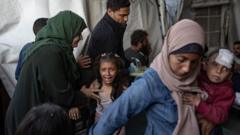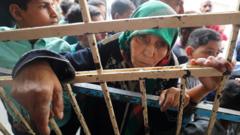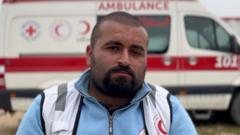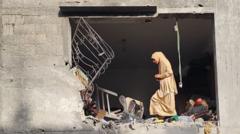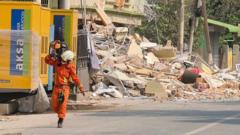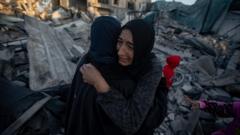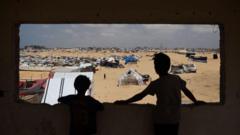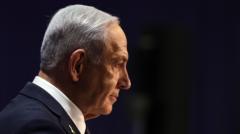Munther Abed, the sole survivor of an attack by Israeli forces that killed 15 emergency workers in Gaza, disputes the Israeli military's claims of self-defense. He emphasizes the humanitarian role of paramedics amidst ongoing tensions and calls for accountability in the wake of the tragedy.
Survivor of Gaza Ambulance Attack Challenges Israeli Military Narrative
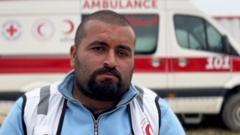
Survivor of Gaza Ambulance Attack Challenges Israeli Military Narrative
Emergency worker Munther Abed recounts the harrowing events of an Israeli airstrike that claimed the lives of 15 ambulance personnel, contradicting official accounts.
Munther Abed, a paramedic from Gaza, is the only person to survive an Israeli attack that resulted in the deaths of 15 emergency workers. His survival came from diving to the floor in the back of his ambulance, as two colleagues in the front were fatally shot during the early hours of March 23. Abed shared his experience, highlighting the moments before the attack, as he and his team, consisting of members from the Palestinian Red Crescent, Gaza’s Civil Defence agency, and the UN agency for Palestinian refugees (UNRWA), responded to reports of gunfire and injured people in Rafah.
According to Abed, around 5:00 AM, Israeli forces opened fire on their well-marked emergency vehicles which had their lights activated. "Everything indicates we are an ambulance vehicle belonging to the Palestinian Red Crescent. All lights were on until we came under direct fire," he stated, rejecting the Israeli military's claim that the ambulances approached suspiciously without headlights.
The Israeli military asserts that forces opened fire in self-defense, citing the movement of uncoordinated vehicles as a potential threat, resulting in the deaths of nine Hamas militants alongside the emergency workers. However, Abed emphasizes that they were solely civilians devoted to providing medical assistance, challenging the claim that Hamas utilized ambulances as a cover.
Following the incident, Abed faced interrogation lasting over 15 hours after surviving the attack, where he was blindfolded and held by Israeli soldiers. The chaos surrounding the shooting led to a collective outcry for accountability from grieving family members of the deceased medics. Parents mourning their sons, who were killed in what they termed "cold blood," exemplified the emotional toll of the event.
The bodies of the victims were discovered buried in sand weeks after the attack, raising grave concerns about the treatment of remains and potential violations of international humanitarian law. Sam Rose, UNRWA’s acting director in Gaza, expressed the urgency for a thorough investigation into the incident, acknowledging the escalating insecurity for healthcare workers in Gaza, where over 1,060 medical personnel have reportedly lost their lives since the onset of conflict.
As questions linger regarding Israel’s commitment to investigating the incident, Abed, clutching prayer beads, vows to share his colleagues’ stories, reinforcing their bond forged through shared service, compassion, and sacrifice amidst a volatile situation. He insists, “If I was not the only survivor, who could have told the world what they did to our colleagues?”



